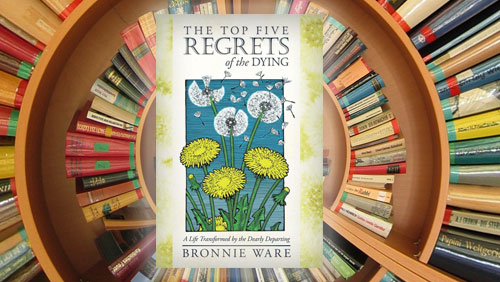In this week’s Pokerography series, Lee Davy, takes a look at Bronnie Ware’s classic, The Top Five Regrets of the Dying, through the lens of the poker world.
Matt Berkey has won and lost millions playing in the biggest live cash games in Las Vegas. But the live cash arena wasn’t where he first earned his stripes. Those were stitched in during an online MTT stretch that created his first serious bankroll.
Berkey woke up each morning, fired up as many MTT tables as he could muster, and played for 12-15 hours straight, six to seven days a week, to build up a roll of $250,000.
Most people would be happy to see their account balance reach $250,000; not Berkey. Talking about those heady days, Berkey told me they ranked amongst the most miserable days of his life. And as he spoke, I couldn’t help think about Bronnie Ware’s book: The Top Five Regrets of The Dying.
Bronnie Ware was a palliative care nurse who spent many years being present with people as th ey slowly died. Ware collected the thoughts of the dying and celebrated their lives on her blog called Inspiration and Chai, and just like a Kim Kardashian gratuitous ass shot, she broke the Internet.
ey slowly died. Ware collected the thoughts of the dying and celebrated their lives on her blog called Inspiration and Chai, and just like a Kim Kardashian gratuitous ass shot, she broke the Internet.
The publishing houses came a knocking and Ware had a top selling book on her hands, and it’s worth reading because we are at least a decade away from ending the problem of ageing and providing seven billion people with the right pill.
If you are like me, you will probably read on and never make any changes. That’s our immortality calling. We all think we are Connor Macleod of the Clan Macleod. But death will come to us all, and it’s trendy to say that we have no regrets in life.
1. I wish I had the courage to live a life true to myself, not the life others expected of me.
Poker players will relate to this one. I have interviewed a lot of them, and not many tell me that they went into poker with the full blessing of their parents.
At some point in a poker player’s life, they must have decided that the allure of the game was strong enough to shatter the expectations of parents hoping they would become lawyers, doctors, or palliative care nurses.
But now what?
You did it once, can you muster up the courage to do it once more?
The poker community is a special place. Bonds form in a unique way that isn’t present in the real world. But you need to keep playing to keep in the community. Once you stop, you are out.
For some, this can mean they keep playing when they don’t want to play through fear of the unknown; fear of losing friends; fear of being ostracised.
Are you taking on the expectations of the community?
Are you living a life true to yourself?
2. I wish I hadn’t worked so hard.
This is what Berkey was referring to when he said his journey to earn $250,000 brought him misery. There is little point in working hard if you don’t enjoy the process.
Entrepreneur Gary Vaynerchuk has a mission to buy the New York Jets. But he is scared of the day that happens. You see, Vaynerchuk isn’t in the game to buy the New York Jets. He is in the game because he loves the process leading up to the acquisition of his childhood dream team. Once he owns them the process ends, his dream dies, and he will probably drop dead of a heart attack.
I quit alcohol seven years ago, and I get annoyed when I hear people tell me I exchanged one addiction for another because I work so hard. I love what I do. I don’t call it work. It’s my passion. If poker feels like this to you, then play, as long as you also incorporate the right balance of body, mind and soul.
But if, like Berkey, you are waking up sick to the teeth of the sound of the Time Up button, then consider the advice the dead are offering, and take your foot off the gas.
3. I wish I had the courage to express my feelings.
 I think this is a big one.
I think this is a big one.
If you are not expressing your feelings then they are clogging up your veins, arteries, and eventually your heart.
There is a myriad of ways that poker players can practice the expression of feelings. Open up a Twitch channel and start communicating with your audience. Answering questions from a place of authenticity are vital if you want to make your channel a success. Trust is everything.
Start a Vlog about life as a poker player. Mix it up with stories of great hands, with how you manage life as a poker player. Becoming a successful poker player is more to do with the way you handle life away from the tables than the way you play on it. Take Stu Ungar as an example.
Creating a podcast is another way to go deeper, as is writing a blog, but the best way is to connect with like-minded people. If you do this, then it is much easier to develop connections because you are free to remove the mask.
4. I wish I had stayed in touch with my friends.
Who are your friends?
I was listening to a Sobriety podcast, and the host was talking about nightclubs and how she thought she used to love them when she was a drinker. Hindsight and clarity of mind showed her that she could not have enjoyed those moments because she hated surface level conversations.
Fake relationships are prevalent in poker. Recognising genuine friendships is difficult. Time again you read stories of betrayal, and you think: ‘how can that happen?’
A friend and an acquaintance are two different things. Don’t let the $20k loan fool you into believing the person holding the cash is your friend.
And how many levels do your friends have?
Is it poker for breakfast, dinner, and tea?
Is that all you talk about?
This wisdom is sound. Stay in touch with your friends, but make sure you know who they are first.
5. I wish I had let myself be happier.
When teaching people to quit alcohol, if I notice they are white knuckling it because they love to drink, I tell them to drink. There is no point being unhappy and abstinent if you can drink and be happy. Choose the latter.
Philipp Gruissem is always a great example of the paradox of happiness in poker. He was on top of the poker world earning millions of dollars when he realised the game was no longer making him happy.
Gruissem was about to quit the game and go in search of happiness when a chance meeting with a movement called Effective Altruism gave him a deeper purpose in life. Now, armed with the knowledge that each hand he wins reduces suffering in the world, Gruissem is happy playing poker.
Why do you play poker?
Does it provide you with happiness?
On your death bed, pouring your heart out to a complete stranger, will poker be one of your regrets?





